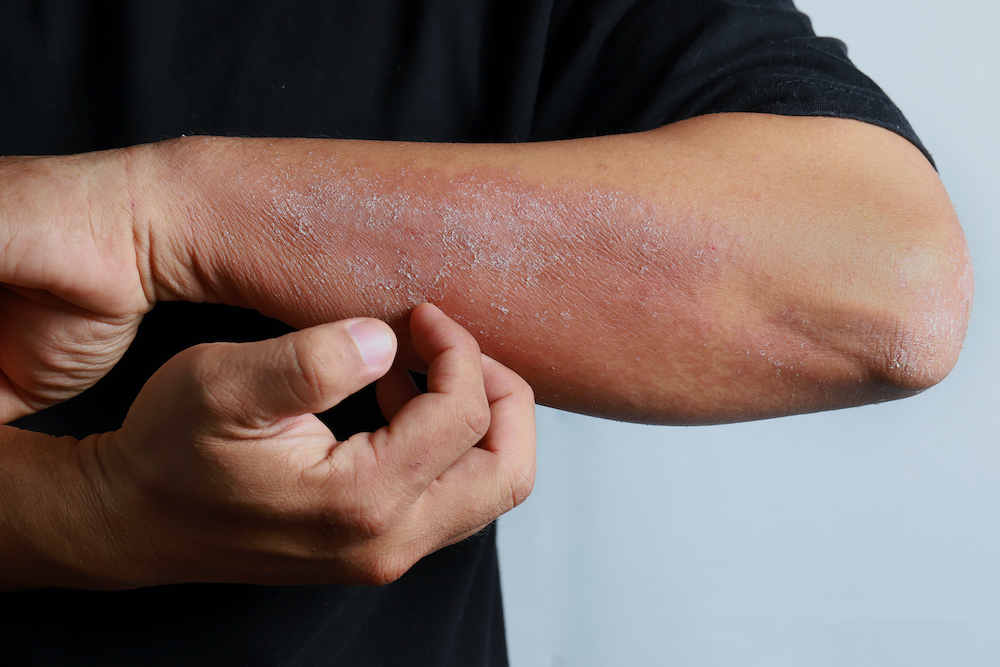Skincare Includes Treating Eczema

You would think with more than 31 million Americans having eczema, there would be more talk about it. Unfortunately, most Americans learn to live with the condition. Since it is not contagious, people typically cover it up instead of seeking treatment. More than 17 million people live with extreme cases.
What is incredible is there are effective treatments, both with medication and lifestyle changes. Licensed and experienced dermatologists bring knowledge that you can’t get from a blog or over the counter at your local drugstore.
Most general practitioner doctors will refer patients with extreme eczema cases to a dermatologist. Dermatologists have different things they can recommend for eczema. Some may suggest medication initially, but some will work with those suffering from eczema to try alternative ways to manage eczema before going to medication. Whether topically applied or internally taken, medicine adds something to your body when maybe eliminating or changing something in your lifestyle can have a significant impact. Having a thorough assessment of your eczema is pivotal in addressing it as soon as possible.
Beyond the outward signs of inflamed skin that may appear red, dry, and itchy, let’s uncover more about this condition that most Americans experience at some point in their lives.
Who Gets Eczema?
The short answer is anyone can get eczema. It doesn’t matter what one’s gender, race, skin type, or age happens to be. Most research supports environmental, genetics, compromised immune systems, and defects in the barrier of the skin. The skin barrier is the protecting wall of your skin, keeping the good stuff in and the bad stuff out. Sun exposure can negatively affect the condition of your skin barrier – always wear sunscreen!
What Causes Eczema?
Although it is not known exactly what causes this skin condition, many research-based opinions exist on factors that can cause or worsen eczema conditions. It is thought to be related to an allergic reaction, which is why many believe the environment can be a factor. Some of the most common culprits are dry air and extreme temperatures. Say goodbye to steaming hot showers and jacuzzi nights! Extreme temperatures can agitate and worsen eczema, so settle for lukewarm and follow up with a recommended moisturizer.
Soaps, cleansers, detergents, certain fabrics such as wool and polyester, and fragrances and metals. Formaldehyde and other chemicals added to make household products more effective are strong and can cause eczema on the skin.
Stress can also trigger eczema, as well as obesity. Asthma and allergies are also thought to be contributors. Infants and children are highly likely to have some form of eczema. However, eczema may go away by changing diet and watching topical products.
Can Treatments for Eczema Help My Skin?
Treatments are available for successfully managing eczema. There is no cure, but topical creams and light therapy are popular options. There is also a myriad of natural treatments, including acupuncture. Some things should be avoided to help mitigate eczema issues. Knowing what triggers inflammation and avoiding those things reduces exposure. Even if you think you have oily skin, a daily moisture routine should be incorporated. An experienced dermatologist can help because most people think they know their skin type but need different products than they use. Stop chronic itching. Of course, this is easier said than done if you deal with the persistent discomfort from eczema. However, a dermatologist can diagnose and recommend products to ease the irritation and reduce itchiness. Avoid lotions with heavy perfumes. Even over-the-counter creams can claim to help with eczema. Most companies also enhance the scent with perfumes and oils that may trigger eczema.
What If Eczema Is Not Treated?
Although children tend to outgrow most mild cases of eczema, if it continues with age, it is worth looking into treatments from a professional dermatology center. What does vary is the range of severity of each eczema case. Daily, those dealing with severe conditions manage rough, leathery, and flaky skin patches and even oozing or crusting skin. If these more severe cases go untreated, skin infections can leave scarring or skin patches. If eczema gets inflamed or infected near the eye, it can cause significant discomfort and cause itchy eyes. It doesn’t take much to connect more serious eczema cases with loss of sleep, stress, isolation, and even infections on the skin.
Dermatologists like Dr. Sherrie Straughn with Buckhead Dermatology have treated many patients with eczema. Her goal and other reputable dermatologists are to offer solutions so patients can enjoy the beauty of their skin instead of hiding it. The embarrassment some people have over their eczema condition can cause another level of stress which can worsen the situation. Having healthy skin can have a compelling impact on your life. Taking care of yourself includes skincare. Having the confidence to present the best version of yourself takes effort but can greatly improve your quality of life.
